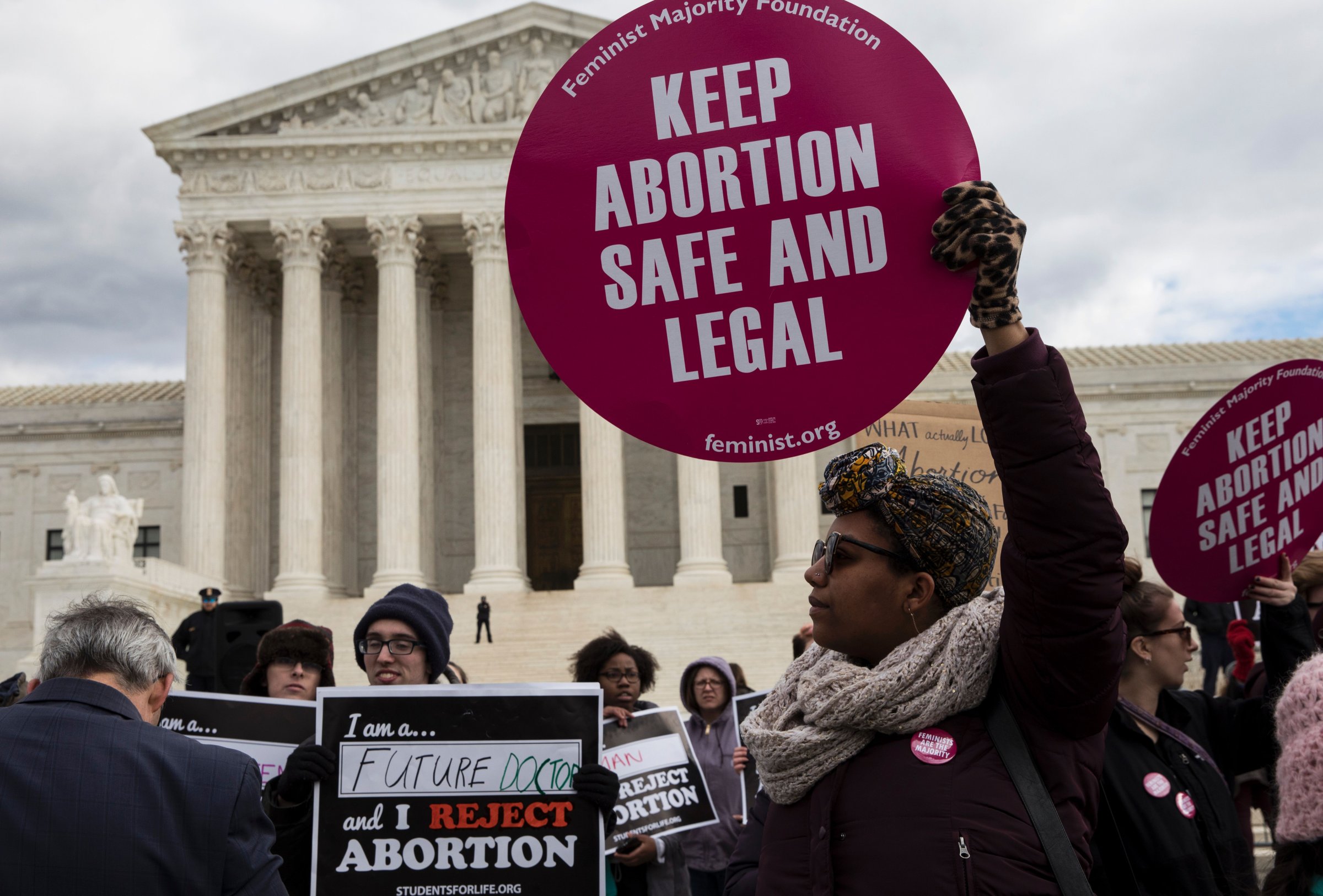
Supreme Court Justice Anthony Kennedy’s retirement announcement on Wednesday sparked immediate questions about the future of abortion rights in the United States.
Kennedy, who was a pivotal swing vote in some of the most controversial rulings of the past 30 years, consistently upheld abortion rights during his tenure. But President Donald Trump campaigned on a promise to select Supreme Court nominees who would “automatically” overturn Roe v. Wade, the landmark 1973 ruling that established the constitutional right to an abortion.
“There’s every reason to believe that Roe v. Wade is on the chopping block,” said University of Chicago law professor Justin Driver, who clerked for Supreme Court Justices Stephen Breyer and Sandra Day O’Connor. “Roe v. Wade has been administered last rites many times, but fears — for supporters of Roe v. Wade — that its days are coming to a close are more justified than ever.”
Experts said it’s entirely possible that Roe v. Wade could be overturned. But, more likely, they said Supreme Court will initially oversee a gradual erosion of abortion rights.
‘Some states will try to outlaw abortion’
In the coming weeks and months, Driver said he expects conservative state lawmakers — anticipating a receptive audience of five consistently conservative Supreme Court justices — will start enacting aggressive laws that test the legitimacy of Roe v. Wade and force legal challenges from reproductive rights groups.
“It’s hard to believe that we’re not on a collision course here because I think it’s unlikely that reproductive rights groups are going to just sit idly by as this is challenged,” Driver said.
Jeffrey Toobin, a CNN legal analyst who has written extensively about the Supreme Court, made a similar argument in a tweet on Wednesday: “Anthony Kennedy is retiring. Abortion will be illegal in twenty states in 18 months.”
“Some states will try to outlaw abortion outright. Others will be more measured,” Driver said, referring to previous state laws that have sought to limit the number of abortion providers or require spousal notification. “The effect of this range of approaches will allow the Supreme Court to select whichever route it wants to go. One plausible scenario is that the court will not eliminate Roe v. Wade in one fell swoop, but instead will erode it over time until there’s little left.”
New rulings could ‘dramatically reduce the scope’ of Roe v. Wade
Columbia law professor Gillian Metzger, the faculty director of the Center for Constitutional Governance and a former clerk for Supreme Court Justice Ruth Bader Ginsburg, said Kennedy’s departure will lead to an “incremental pullback” from Roe v. Wade and Planned Parenthood v. Casey — a 1992 decision that reaffirmed the constitutional right to have an abortion.
“In practice it will become even more difficult, and in some states practically impossible, for women to exercise the right recognized in Roe and Casey of making the ultimate choice of whether or not to bear a child,” Metzger said in an email.
She said that could begin with the Supreme Court sustaining decisions by lower courts that are at odds with the Supreme Court’s 2016 ruling on Whole Women’s Health v. Hellerstedt — which struck down a Texas law that would have significantly limited the number of abortion clinics in the state. The ruling was decided with a 5-to-3 vote, and Kennedy ruled with the majority.
“States are continuously passing new laws, for example limiting access to medication abortion and dramatically limiting the window of time in which women can obtain abortions,” Metzger said. “If sustained, as might well happen, these restrictions will as a practical matter close off abortion access in many areas of the country.”
Some legal experts say the reason why Roe v. Wade won’t be immediately overturned is Chief Justice John Roberts, a President George W. Bush appointee whom George Washington University law professor Jonathan Turley described as “the greatest institutionalist of his generation.”
“He is someone who believes deeply that the integrity of the court requires consistency and coherence across case precedent,” Turley said. “I think that Roberts would be a hard sell for a frontal attack on Roe v. Wade. However, I think that Roberts would support collateral attacks that could dramatically reduce the scope of Roe v. Wade.”
The effects will ‘reverberate across the entire society’
That impact is still concerning to abortion rights advocates, who argue that even limiting the scope of Roe v. Wade would dramatically change American life.
“If women can’t control their reproductive bodies — and it’s a crime to do so — we’ll also see a drop in women in the wage labor market, in politics, as heads of corporations,” said Katherine Franke, director of the Center for Gender and Sexuality Law at Columbia University. “What will unravel once we overrule Roe, I think, will reverberate across the entire society.”
Alana Abramson contributed reporting.
More Must-Reads from TIME
- Cybersecurity Experts Are Sounding the Alarm on DOGE
- Meet the 2025 Women of the Year
- The Harsh Truth About Disability Inclusion
- Why Do More Young Adults Have Cancer?
- Colman Domingo Leads With Radical Love
- How to Get Better at Doing Things Alone
- Michelle Zauner Stares Down the Darkness
Write to Katie Reilly at Katie.Reilly@time.com